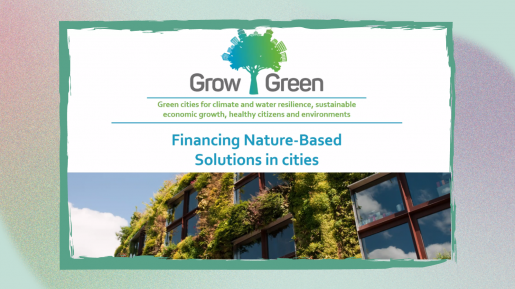NbS and finance: what are the key factors enabling financial flow into the sector?
When talking about transitioning towards a more nature-conscious society, discussing the monetary side of things is essential in order to ensure its feasibility and imminence. In light of this, GrowGreen’s webinar titled “Financing Nature-based solutions” gives valuable insight into the opportunities and hindrances to finance flow in the sphere of nature-based solutions (NbS). NICHES participated in the event in its capacity as a project focusing on the benefits of NbS in cities. The expertise of the panellists directly correlates to the themes NICHES explores in its work.
GrowGreen is a project that aims to create climate and water resilient, healthy and liveable cities by investing in NbS. Its webinar held on 12 September 2022, and organised in partnership with Trinomics and the International Union for Conservation of Nature (IUCN), focused on discussing the limitation to finance flows in NbS. The event brought together city representatives, civil society, businesses, financing institutions, and investors to consider what approaches to financing are being applied in cities.
The webinar showcased IGNITION project’s journey in finding financial opportunities beyond the use of municipal budgets and grant money. IGNITION focuses on the Greater Manchester area in the United Kingdom. The project relied on building investor confidence in NbS through demonstrating its benefits and key beneficiaries through statistical data. The project further developed location-specific business models and innovative funding mechanisms.
The webinar continued with a presentation from the Institute of Natural Resource Sciences (IUNR or ZHAW) in Basel about the city’s green roofs initiative. Campaigns and legislations are key milestones on the path of ensuring NbS ubiquity. Basel has promoted green roofs via investment in incentive programmes, which has provided subsidies for green roof installation. Today, legislation dictates that green roofs are mandatory for new buildings across Switzerland.
The webinar ended with an economic point of view presented by Trinomics, a consultancy offering policy advice related to energy, environment, and climate change issues. Trinomics identified key market barriers and available solutions for diversifying financing for NbS in cities. They linked hindrances to NbS finance with fundamental market features that need to be reformed. Obstacles being information failures such as NbS impact being difficult to quantify, the skills and expertise shortage in the sector, as well as the unawareness of the general public about NbS advantages.
The fundamental market structural problems include the fact that NbS have strong ‘public good’ attributes and public goods are difficult to monetise. According to Trinomics, the reality is that private interests will only invest in public goods to the extent that they can directly benefit.
The solution to increasing private investment would be to change market structures (e.g. regulatory changes targeting private actors), stimulating the private markets for public goods (e.g. carbon, biodiversity, water pollution (cap and trade)), and locating co-financing opportunities (e.g. blending private and public funds reflecting private and public benefits). The role of governments is a leader in these efforts.
